

One degree of global warming causes a 50% increase in population displacement risk. A new study shows that if the population were fixed at current levels, the risk of population displacement due to river floods would rise by ~50% for each degree of global warming.
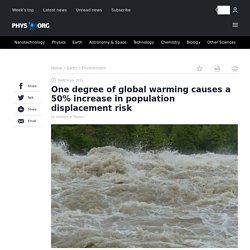
However, if population increases are taken into account, the relative global flood displacement risk is significantly higher. The research, by an international team from Switzerland, Germany, and the Netherlands, used a global climate-, hydrology- and inundation-modelling chain, including multiple alternative climate and hydrological models, to quantify the effect of global warming on displacement risk for both current and projected future population distributions. Their results are published today in the IOP Publishing journal, Environmental Research Letters. Since 2008, disasters caused by natural hazards have caused 288 million people to be displaced, three times the number displaced as a result of wars, conflicts and violence. Good vibrations: bladeless turbines could bring wind power to your home. The giant windfarms that line hills and coastlines are not the only way to harness the power of the wind, say green energy pioneers who plan to reinvent wind power by foregoing the need for turbine towers, blades – and even wind.

“We are not against traditional windfarms,” says David Yáñez, the inventor of Vortex Bladeless. His six-person startup, based just outside Madrid, has pioneered a turbine design that can harness energy from winds without the sweeping white blades considered synonymous with wind power. How grassroots schemes across UK are tackling climate crisis. Communities across the UK are tackling the climate crisis with hundreds of local schemes ranging from neighbourhood heating to food co-ops, community land ownership projects and flood defences, according to a report.
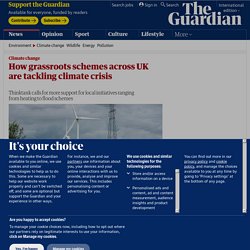
A study from the IPPR thinktank found that community projects, often set up with the primary aim of reducing poverty and improving people’s day-to-day lives, were also reducing emissions and restoring nature. Luke Murphy, the lead author of the report, said: “Under the radar there are already flourishing and transformative community initiatives to pool resources and create shared low-carbon energy, housing and natural assets … These groups have shown that they can increase community wealth and create thriving places while addressing the climate crisis.”
The report identifies hundreds of initiatives, including: Study shows Mekong droughts drive up carbon emissions, energy costs as dams go dry. New research shows hydropower in the Mekong region will become far less sustainable as droughts force countries to rely on coal and gas power plants, driving up carbon emissions and electricity costs.
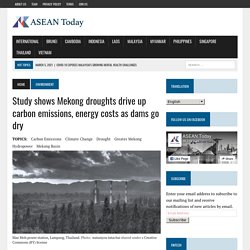
The findings present a problem for Mekong countries’ dam building plans, as hydropower appears far less green and less reliable than other renewable sources. Editorial. This prefab kit makes it easy to retrofit old buildings. The threat of high-probability ocean ‘tipping points’ Climate change is profoundly altering our oceans and marine ecosystems.
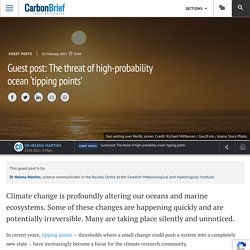
Some of these changes are happening quickly and are potentially irreversible. Many are taking place silently and unnoticed. In recent years, tipping points – thresholds where a small change could push a system into a completely new state – have increasingly become a focus for the climate research community. However, these are typically thought of in terms of unlikely changes with huge global ramifications – often referred to as “low probability, high impact” events. How global business could mitigate climate change. Amid the coronavirus pandemic, everyone is rightly focused on protecting lives and livelihoods.
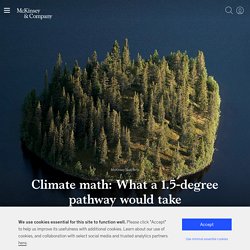
Can we simultaneously strive to avoid the next crisis? The answer is yes—if we make greater environmental resilience core to our planning for the recovery ahead, by focusing on the economic and employment opportunities associated with investing in both climate-resilient infrastructure and the transition to a lower-carbon future. Adapting to climate change is critical because, as a recent McKinsey Global Institute report shows, with further warming unavoidable over the next decade, the risk of physical hazards and nonlinear, socioeconomic jolts is rising. Trillions of extra economic damages predicted in new study of climate change effects. The world is underestimating the economic effects of climate change by trillions of dollars, according to a new study co-authored by scientists from the University of Warwick.
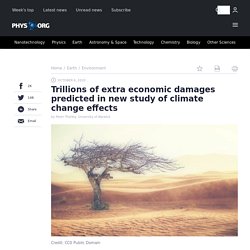
The study, led by Georgetown University and published in Nature Communications today (6 October), shows that current economic forecasting models fail to account for unpredictable variations in global temperatures, rather than the more predictable rising temperatures themselves. Co-author Professor Sandra Chapman, of the University of Warwick Department of Physics, said: "When we cause a system like the Earth's climate to warm, it does not warm smoothly and uniformly.
Changes in the Earth's temperature translate into economic damages and our work estimates the additional economic damage that we can expect due to these fluctuations in earth's global mean temperature on top of the smooth gradual increase due to increasing CO2 in the atmosphere. " Cost of Inaction Making New Policies More information: Raphael Calel et al. Net zero by 2050 plan for energy sector is coming. This op-ed article was first published by the Financial Times Our climate challenge is an energy challenge.
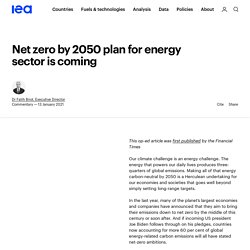
The energy that powers our daily lives produces three-quarters of global emissions. Making all of that energy carbon-neutral by 2050 is a Herculean undertaking for our economies and societies that goes well beyond simply setting long-range targets. Top scientists warn of 'ghastly future of mass extinction' and climate disruption. The planet is facing a “ghastly future of mass extinction, declining health and climate-disruption upheavals” that threaten human survival because of ignorance and inaction, according to an international group of scientists, who warn people still haven’t grasped the urgency of the biodiversity and climate crises.
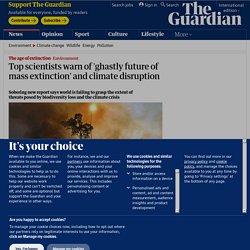
The 17 experts, including Prof Paul Ehrlich from Stanford University, author of The Population Bomb, and scientists from Mexico, Australia and the US, say the planet is in a much worse state than most people – even scientists – understood. “The scale of the threats to the biosphere and all its lifeforms – including humanity – is in fact so great that it is difficult to grasp for even well-informed experts,” they write in a report in Frontiers in Conservation Science which references more than 150 studies detailing the world’s major environmental challenges.
An estimated one million species are at risk of extinction, many within decades, according to a recent UN report. Global heating could stabilize if net zero emissions achieved, scientists say. The world may be barreling towards climate disaster but rapidly eliminating planet-heating emissions means global temperatures could stabilize within just a couple of decades, scientists say.
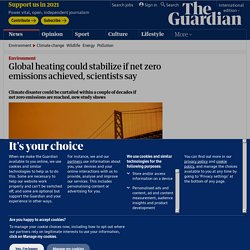
For many years it was assumed that further global heating would be locked in for generations even if emissions were rapidly cut. Climate models run by scientists on future temperatures were based on a certain carbon dioxide concentration in the atmosphere. If this remained at the current high level there would be runaway climate disaster, with temperatures continuing to rise even if emissions were reduced because of a lag time before greenhouse gases accumulate in the atmosphere. Climate Change Will Roast Cities More Than Anywhere Else. Heat Islands Scientists are taking aim at a commonly-overlooked problem in the fight against climate change: what to do about cities.
New research shows that the average temperature within a city will rise well beyond the global average temperatures that climate initiatives tend to focus on, Wired reports. In fact, the new models show that metro areas could end up 4.4 degrees Celsius hotter by the year 2100. That presents a major health risk to those that live there, as well as a fresh challenge for those seeking to limit climate change’s impact. Hot Spots For context, the 2015 Paris Agreement seeks to limit global temperatures to a 1.5-degree-Celsius increase over preindustrial levels.
New Analysis Shows Climate Could Stabilize in Several Decades. Cold Turkey In an unusual example of optimistic climate change research, scientists now suspect that rising global temperatures and the impacts of climate change could stabilize in a matter of decades. To be clear, the catch is that the findings would depend on the world rapidly transitioning away from fossil fuels to the point that greenhouse gas emissions reach a net-zero point, The Guardian reports. That’s a staggering challenge, especially because several large countries are already behind on the 2015 Paris Agreement and U.S. How a 'tree mortgage' scheme could turn an Indian town carbon neutral. In the misty, hilly terrain of Wayanad, in the southern Indian state of Kerala, the people with any access to land in the quiet town of Meenangadi have been out counting their trees. Sheeja CG, a 46-year-old farmer, has lived among coffee, coconut and pepper plantations all her life but last month she increased her income dramatically by mortgaging 53 of her trees at the local bank, in return for a sum of 2,650 rupees (£26.96), or 50 rupees each.
How smallholder farmers can combat their reliance on staple crops - BCFN Foundation: Food and Nutrition Sustainability Index. Dr Morris Akiri, Regional Director Africa, CABI To combat the adverse effects of climate change, smallholder farmers need to adapt and diversify what they grow. That requires finding better ways to share information and knowledge, says Morris Akiri, regional director for Africa at the Centre for Agriculture and Biosciences International. The world’s population relies overwhelmingly on four staple crops which together account for more than three-quarters of our food supply: maize, rice, soybean and wheat.
Global food shortages will arise when these crops fail in a warmer climate, as is increasingly the case. Where China Stands on Climate Target Goals From 5-Year Plan. Sign up for Next China, a weekly email on where the nation stands now and where it's going next. China is the front line in the global battle against climate change. It’s the nation with the most people, where half of the world’s coal is burned to use more energy than any other country. China currently emits the most greenhouse gases, and there’s not yet a sign of reaching the peak. The rate of growth presages continued rising emissions. Global Risks Report 2020. When might the world exceed 1.5C and 2C of global warming? Under the Paris Agreement adopted in 2015, virtually all the world’s nations pledged to limit global warming to “well below” 2C above pre-industrial levels and also, if possible, “pursue” efforts to cap warming at 1.5C.
At present, the world is not close to being on track to meet either target. While the growth of global emissions has slowed in recent years, there is a large and growing gap between current commitments and what would be needed to avoid exceeding these global temperature limits. Reaching UK net zero target cheaper than we thought, says climate adviser.
Reaching net zero carbon emissions in the UK is likely to be much easier and cheaper than previously thought, and can be designed in such a way as to quickly improve the lives of millions of people, a senior adviser to the government has said. Matt Ridley: Global Warming Versus Global Greening. The Royal Society, London. Extreme weather highlights Southeast Asia's vulnerability to climate change. Global heating threatens UK wildlife’s ability to adapt and survive. Global heating is shifting Britain’s climatic zones by up to 5km each year, outpacing wildlife’s ability to adapt and survive, according to a new report by Rewilding Britain. If species cannot adapt to higher temperatures or relocate elsewhere, they will be threatened with extinction. But research by the rewilding charity suggests that restoring and connecting species-rich wild habitat across 30% of Britain’s land and sea by 2030 could save a fifth of species from climate-driven habitat loss, decline or extinction.
Rewilding Britain is calling for the creation of core rewilding areas, where as many natural processes, habitats and related species are restored as possible, across at least 5% of the UK, with a mosaic of nature-friendly land and seas across another 25%. What China's plan for net-zero emissions by 2060 means for the climate. When I first moved to China in 1990, winter meant coal. Thought Leader Series: Jay Inslee on the power of optimistic climate action. China's president says the world must work together on climate change. Global heating: the vital statistics from a warming world. A Sensitive Matter Foreword inc. RCP 8.5—A scenario of comparatively high greenhouse gas emissions. IIASA modeling framework RCP8.5 was developed using the IIASA Integrated Assessment Modeling Framework that encompasses detailed representations of the principal GHG-emitting sectors—energy, industry, agriculture, and forestry.
The framework combines a careful blend of rich disciplinary models that operate at different spatial resolutions that are interlinked and integrated into an overall assessment framework (Fig. 1). Integration is achieved through a series of hard and soft linkages between the individual components, to ensure internal scenario consistency and plausibility (Riahi et al. 2007).
IIASA modeling framework (adapted from Riahi et al. 2007) The three principal models of the IA framework (Fig. 1) are MESSAGE–MACRO (Messner and Strubegger 1995; Rao and Riahi 2006), DIMA (Rokityanskiy et al. 2007) and AEZ–WFS (Fischer et al. 2007) (see below for further details). More growth, less warming. New studies confirm weakening of the Gulf Stream circulation (AMOC) Explosion Opens New ‘Pit to Hell’ Crater in Russian Arctic. There’s No Containment Strategy for Climate Change. Large blue butterfly returns to Cotswolds site for first time in 150 years. History Made As Ocean Cleanup Successfully Collects First Plastic From The Great Pacific Garbage Patch. Thought Leader Series: Damon Gameau and the world in 2040. Should Plants and Animals That Relocate Because of Climate Change Be Considered Invasive? Climate crisis exerting increasing impact on UK, says Met Office. Global CO2 emissions in 2019 – Analysis - IEA.
How Coronavirus Impacts Climate Change. Freak weather strikes Middle East as snowfall and biblical flash floods spark fears. How do volcanoes affect world climate? Ask Ethan: Can We Build A Sun Screen To Combat Global Climate Change? The Arctic heatwave: here's what we know. 2019 was 2nd hottest year on record for Earth say NOAA, NASA. Where China Stands on Climate Target Goals From 5-Year Plan. Start-ups test ideas to suck CO2 from atmosphere. Climate change made Siberian heatwave 600 times more likely – study.
Against Environmental Pessimism. Farmers hatch plan to return area the size of Dorset to wild nature. Coronavirus: The Path to the Next Normal. How business leaders should confront climate risk. Deadly Heatwaves. How animals are coping with the global 'weirding' of the Earth's seasons. Global GDP Could Fall 20% as Climate Change Heats up. This is what the #ClimateEmergency looks like in the #Himalayas right now. The Himalayas hold more snow and ice than anyw… COVID-19 is a wake-up call to businesses and society to do more for the environment. A Disastrous Summer in the Arctic. The Arctic heatwave: here's what we know. World has six months to avert climate crisis, says energy expert.
Climate worst-case scenarios may not go far enough, cloud data shows. New study shows loss of Southeast Asia's peat forests drives climate change. Researchers Found a New Defense to Help Coral Survive Bleaching. Africans are building a Great Green Wall of trees across the continent to slow down the Saharan. A supplement for cows that curbs climate change-causing burps is catching on. Minnesota scientists are making an experimental forest for a future climate. How Is the Coronavirus Pandemic Affecting Climate Change? The dramatic drop in carbon emissions due to coronavirus, quantified. Climate crisis may have pushed world's tropical coral reefs to tipping point of 'near-annual' bleaching. Fridays for Future Took Foreign Policy Out of the Hands of Bureaucrats and Officials in 2019. Next Year, Greta Thunberg’s Movement Could Go Further.
Climate risk and decarbonization What every mining CEO needs to know. For Vietnamese minority communities, climate change isn't coming; it's here. MGI Climate risk and response Exec summary vF. Russia announces plan to ‘use the advantages’ of climate change. Climate crisis fills top five places of World Economic Forum’s risks report. Australia Shows Us the Road to Hell. Turning farming upside down: mob grazing on a Cumbrian hill farm. Grass growing around Mount Everest as global heating intensifies. Dr. Jonathan Foley sur Twitter : "Wonder where greenhouse gases come from? Here are two plots I put together showing the major sources, and the different activities that create them. It's based on global emissions inventories reported in the IPCC Third Wo.
Fridays for Future Took Foreign Policy Out of the Hands of Bureaucrats and Officials in 2019. Next Year, Greta Thunberg’s Movement Could Go Further. Climate Change Worst-Case Scenario Now Looks Unrealistic. How water is helping to end 'the first climate change war' German Unions Are Waking up to the Climate Disaster. Nepal must prepare for climate migration. How an Army of Women Resurrected a River. MIGRATION MITIGATION. Climate change is causing birds to shrink, study says. Warming Waters, Moving Fish: How Climate Change Is Reshaping Iceland.
In Bangladesh is klimaatverandering nú. How the Climate Crisis Is Killing Us, in 9 Alarming Charts. The rising seas climate change has already locked in - Axios. 11K Scientists: Please Panic, Climate Change Will Kill Us All. Flying Isn’t the Source of Our Global Warming Problems, So Let’s Focus Our Energies Elsewhere. UN Says Climate Genocide Coming. But It’s Worse Than That. Trying to Plant a Trillion Trees Won't Solve Anything. Climate is missing the point. We have an ecosystem emergency. 2019 Had the Smallest Ozone Hole on Record. Renewable energy to expand by 50% in next five years - report. Big Oil Fears the New Wave of Climate Activism. How Will Climate Change Alter Agriculture? Winemakers Are Finding Out. Firms ignoring climate crisis will go bankrupt, says Mark Carney.